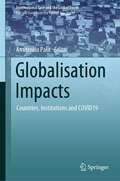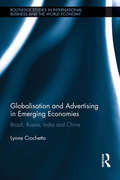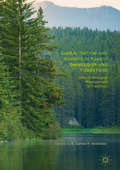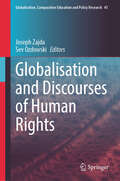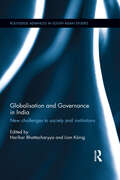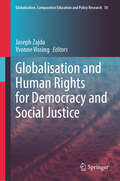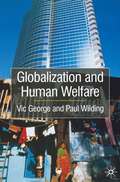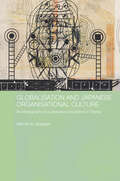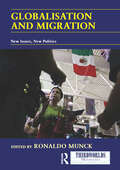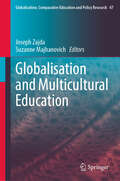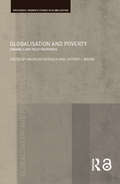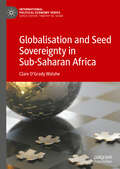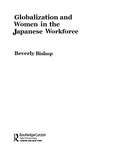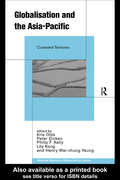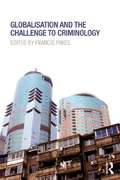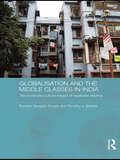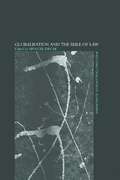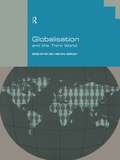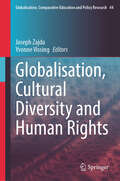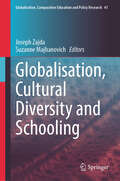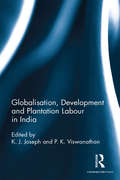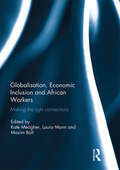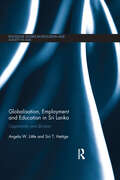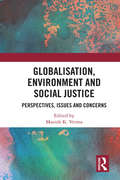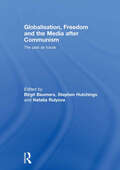- Table View
- List View
Globalisation Impacts: Countries, Institutions and COVID19 (International Law and the Global South)
by Amitendu PalitThe book reviews globalisation by identifying causes behind the discontent it has produced in recent years. It variously engages in economics, political economy, development and policy discourses to study experiences of countries and institutions in managing and adjusting to globalisation. Extending the analysis to latest global developments, including the remarkable advance of technology and digitalisation, and political and economic upheavals caused by COVID19, the book collects varied academic perspectives and reflects on the present as well as future. Comprising chapters written by distinguished academics and policy experts, the book is a rare collection of cross-disciplinary objective evaluations of globalisation.
Globalisation and Advertising in Emerging Economies: Brazil, Russia, India and China (Routledge Studies in International Business and the World Economy)
by Lynne CiochettoBrazil, Russia, India and China are four of the largest and most dynamic contemporary emerging economies in the world. Strong economic growth in each of these economies has been accompanied by the expansion of the advertising and consumer goods sectors. Using a series of country studies, this book explores the dynamics of global capitalism from the perspective of global advertising. The book highlights the on-going expansion of advertising and consumerism against the wider socio-economic, political and cultural contexts. It provides fresh insights about contemporary global priorities, and argues that advertising plays a key role linking culture and the economy. By presenting individual case studies of advertising campaigns, it offers examples of the globalisation of specific brands. Environmental implications of the expansion of advertising and its role in stimulating consumerism are explored in the context of the four emerging economies. The book compares and contrasts the individual country profiles, and makes an assessment of the validity of the argument regarding their projected importance and the likelihood of their future dominance of the global economy.
Globalisation and Change in Forest Ownership and Forest Use
by E. Carina KeskitaloThis book describes the changing landscape of European forest ownership and explores the impact a new, often urban, generation of forest owners may have on the future of one of our most basic resources – forests. Forests have not played a major role in rural studies thus far, however they constitute an important part of many rural areas. Drawing on Swedish cases and comparison cases from various other areas of Europe, the authors present these ‘new forest owners’ as a pivotal factor in the changing relationships between urban and rural life. The chapters explore how forest production, the relationship to the environment, urban-rural relations and local communities have already changed as well as discussing what might be expected for the future. A result of work in the Swedish research programme PLURAL and related projects, such as the EU Cost Action FACESMAP, this volume will be of interest to scholars of forestry and rural studies, as well as to researchers in environmental, population and globalization studies more broadly.
Globalisation and Discourses of Human Rights (Globalisation, Comparative Education and Policy Research #45)
by Joseph Zajda Sev OzdowskiThis book examines dominant discourses in human rights education globally. Using diverse paradigms, ranging from critical theory to discourse analysis, it examines major human rights education reforms and policy issues in a global culture. It also focuses on the ambivalent and problematic relationship between human rights education discourses, ideology and the state. The book discusses democracy, ideology and human rights, which are among the most critical and significant factors defining and contextualising the processes surrounding human rights education globally. It critiques human rights education practices and policy reforms, illustrating the shifts in the relationship between the state, ideology, and human rights education policy. The book also examines developments in research concerning human rights education. Readers will gain a more holistic understanding of the nexus between human rights education, and dominant ideologies, both locally and globally. The book also provides easily accessible, practical yet scholarly insights into international concerns in the field of human rights education in the context of global culture.
Globalisation and Governance in India: New Challenges to Society and Institutions (Routledge Advances in South Asian Studies)
by Harihar Bhattacharyya Lion KönigThis book examines the impact of globalization on some vital aspects of Indian politics, its structures and processes, and identifies the challenges to globalization itself, in order to highlight India’s complex and fascinating story. In 1991, India officially embraced the policy of neo-liberal reforms by signing the GATT agreement, which exposed the country, its society, culture and institutions to the various forces of globalization. Globalization as such may not be new to India, for the country has been embracing the influence of external cultures and civilisations for millennia, but the post-1991 reforms policy marked a significant shift, from a predominantly social welfare state and a command economy to a predominantly market driven one. Through a range of disciplinary perspectives, the authors analyse how India’s version of secularism, communal harmony, nationhood, the public sphere, social justice, and the rights of aboriginal communities came under attack from the forces of the new dispensation. The book goes on to show how globalisation in India has posed fresh challenges to political economy, democracy, federalism, decentralization, parliamentary system, judiciary, and the parliamentary Left. Critically reflecting on themes in the context of India’s globalisation that are local, regional, national and global, this book will be of interest to those in the fields of South Asian Politics, Globalisation, and International Relations.
Globalisation and Human Rights for Democracy and Social Justice (Globalisation, Comparative Education and Policy Research #50)
by Joseph Zajda Yvonne VissingThis book analyses major discourses of human rights for democracy and social justice. The chapters contained in the book examine critically major issues confronting human rights for democracy and social justice both locally and globally. The chapters analyze the challenges that different societies are confronted with, as they attempt to implement, protect and defend democracy, cultural diversity and human rights in an ever-changing world, and culturally diverse environment. Topics covered include dimensional concerns for social justice and human rights and what to do about them, human rights for democracy and social justice, and celebrating cultural diversity in sport. The book will help readers to explore their own views and consider more broadly what may be in the best interests of a fair and just society, as envisioned in human rights treaties, human rights education in schools, and cultural diversity.
Globalisation and Human Welfare
by Vic George Paul WildingThis thematically structured text offers an ideal introduction to the positive and negative effects of globalization on human welfare in industrial and developing societies. It documents the effects of globalization on economic growth, income distribution, poverty, education, health, social care and the environment. It pays special attention to the effects of globalization on ethnic and gender issues and concludes with an assessment of the possibilities of global social policy. It will appeal to undergraduates in the social sciences both as a basic text and a reference book.
Globalisation and Japanese Organisational Culture: An Ethnography of a Japanese Corporation in France
by Mitchell SedgwickGlobalisation � the global movement, and control, of products, capital, technologies, persons and images � increasingly takes place through the work of organisations, perhaps the most powerful of which are multinational corporations. Based in an ethnographic analysis of cross-cultural social interactions in everyday workplace practices at a subsidi
Globalisation and Migration: New Issues, New Politics (Thirdworlds Ser.)
by Ronaldo MunckThis book critically examines the new issues and new politics regarding migration in the era of globalisation from a majority world perspective. It examines the current shifts in the global political economy and the effects it has, for example, in relation to rural displacement. When and how does this lead to national and/or transnational migration? We need to examine the ways in which migration is cut across and impacts on the generation of racism and xenophobia in the west. The issue of remittances by migrants to the ‘developing’ nations needs careful study as does the controversial issue of ‘brain drain’ versus ‘brain gain’ through migration. The growing importance of trafficking for forced labour has now been taken up by various international bodies but is it the new normality or simply an unfortunate side effect of globalisation to be overcome through legislation? Migration is becoming increasingly gendered in its composition and flows but also in the receiving countries where men and women do very different jobs. We can predict the increasing racialization and gendering of migration but how will the state and society respond to these shifts? This book was published as a special issue of Third World Quarterly.
Globalisation and Multicultural Education (Globalisation, Comparative Education and Policy Research #47)
by Joseph Zajda Suzanne MajhanovichThis book analyses dominant discourses of globalisation, multiculturalism and schooling. The chapters advance further the discussions on globalisation and its impact on cultural diversity and multiculturalism in a globalised world. Multicultural education, as presented in this volume, is seen in a broad context. It includes factors such as race, ethnicity, gender, socio-economic status, culture, age, and physical ability, as well as a variety of beliefs and values. Zajda has argued that globalisation represents a synthesis of technology, ideology, and organisation, specifically related to border crossings of people, global finance, trade, IT convergence, as well as cross-cultural communication. The reality of multiculturalism has been brought into stronger focus because of globalisation. Multiculturalism is more evident today because of globalisation. The book contributes in a very scholarly way, to a more holistic understanding of the nexus between globalisation and dominant models of multicultural education, and their impact on students’ engagement, and academic achievement.
Globalisation and Poverty: Channels and Policy Responses (Routledge Studies in Globalisation)
by Maurizio Bussolo Jeffery I. RoundThe consequences of globalization for the world's poor are uncertain and fierce rhetoric is dividing its supporters and detractors. The channels of effect of essentially macroeconomic shocks on the microeconomic position of individuals and households in poor countries are many and various. This book addresses three core issues: 1) what are the main channels of effect? 2) what are the lessons to be learned from policy measures to alleviate negative poverty consequences? and 3) do the proposed analytical approaches assist in providing a monitoring capability? This volume assesses the more easily quantifiable effects resulting from price and quantity responses in the goods and labour markets. It includes studies of Colombia, Ghana, India, Nepal, Bangladesh and Vietnam. It uses key analytical approaches, most of which are based on numerical simulation methods employing models with different levels of complexity. These models capture the features of an economy, how it functions, and how it might respond to globalization shocks. The most important collective contribution of the authors is their establishment of directions and magnitudes of effect, based on empirical evidence.
Globalisation and Seed Sovereignty in Sub-Saharan Africa (International Political Economy Series)
by Clare O'Grady Walshe"It is my expectation that respect for the critical importance of seed sovereignty will in due course be recognised by member states of the United Nations to be as critical to global peace and security as the UN Charter demands in respect of State sovereign equality, justice, human rights and economic and social wellbeing for all peoples."—Denis J. Halliday, UN Assistant Secretary-General 1994-98 "A constructive contribution to our understanding of what is going wrong and what can go right in the complex area of seed sovereignty."—Dervla Murphy, renowned travel writer and adventurer"Keeping seed diversity alive is the secret ingredient, not just for the good, nutrient-dense food that every cook, gardener and farmer/producer needs, but for strengthening our resilience in the face of multiple environmental threats. This compelling and timely book helps us to understand what we are up against and how we can overcome it."— Darina Allen, internationally renowned cook, founder of Ballymaloe Cookery school and President of the East Cork Convivium of Slow FoodThis book studies the relationship between globalisation and seed sovereignty in Sub-Saharan Africa. It provides comparative case studies of the most recent Kenyan and Ethiopian seed laws, as well as a study of seed sovereignty 'on the ground' in a locality within Ethiopia. Based on extensive fieldwork, it identifies the interests and motivations of transnational seed corporations, global philanthropic organisations, state actors, and local farmers. It finds significant differences in the wording of seed laws and the exercise of seed sovereignty, applying theories of globalisation to help us better understand these varied outcomes. It shows that seed sovereignty has the potential to be shared between local, national, regional, and global authorities, but in different ways in different countries and localities. In the face of what might sometimes appear to be unstoppable global forces, these findings suggest that the exercise of seed sovereignty can be transformed even in a highly globalised world.
Globalisation and Women in the Japanese Workforce (The University of Sheffield/Routledge Japanese Studies Series)
by Beverley BishopGlobalisation and Women in the Japanese Workforce contributes to the debate about the impact of globalisation upon women. It examines the effect of restructuring upon women's employment in Japan and describes the actions women are taking individually and collectively to campaign for change in their working environment and the laws and practices regulating it.
Globalisation and the Asia-Pacific: Contested Territories (Routledge Studies in Globalisation #Vol. 1)
by Peter Dicken Henry Wai-chung Yeung Lily Kong Philip F. Kelly Kris OldsMost books that analyse the crucial subject of globalisation only look at it from a western perspective. This is the first detailed study to look at globalisation specifically in the Asia-Pacific region. An impressive collection of leading, interdisciplinary scholars explore various dimensions of globalisation and their relationship to development processes in the region.
Globalisation and the Challenge to Criminology
by Francis PakesThere is no doubt that globalisation has profound effects on crime, justice and our feelings of security, identity and belonging. Many of these affect both the making of laws and the breaking of laws. It has been argued however that criminology has been too provincial, focusing as it often does on national laws and issues, whilst others have said that globalisation is the stuff of international relations, global finance and trade, not of criminology. This book disputes this by asserting that criminology has a firm place in this arena and globalisation offers the discipline a challenge that it should relish. Some of the field’s top scholars from the UK, the US, Canada, Australia and New Zealand consider these challenges and present cutting-edge analysis and debate. Topics covered include transnational organised crime, international policing and a range of other issues involving global harm such as genocide, the workings of international financial institutions, the fate of international migrants and the impact of anti-immigration sentiments in Europe. A particular focus is on borders and arrangements that deal with migration and populations that are excluded and adrift. This book highlights criminology’s analysis and engagement in new understandings of globalisation, in particular its harmful and unethical manifestations, and offers a mode of scrutiny and vigilance. Globalisation and the Challenge to Criminology will be of particular interest to those studying criminology, criminal justice, policing, security and international relations as well as those who seek to understand globalisation and, in particular, its harmful outcomes.
Globalisation and the Middle Classes in India: The Social and Cultural Impact of Neoliberal Reforms (Routledge Contemporary South Asia Series)
by Ruchira Ganguly-Scrase Timothy J. ScraseThis book fills an important gap in the existing literature on economic liberalization and globalisation in India by providing much needed ethnographic data from those affected by neoliberal globalisation. Based on ethnographic fieldwork and interviews, it reveals the complexity of the globalisation process and describes and accounts for the contradictory attitudes of the lower middle classes. The authors challenge the notion of a homogeneous Indian middle class as being the undoubted beneficiaries of recent neoliberal economic reforms, showing that while the lower middle classes are generally supportive of the recent economic reforms, they remain doubtful about the long term benefits of the country's New Economic Policy and liberalisation. Significantly, this book discusses and analyzes both the economic and cultural sides to globalisation in India, providing much-needed data in relation to several dimensions including the changing costs of living; household expenditure, debt and consumerism; employment and workplace restructuring; gender relations and girls’ education; global media and satellite television; and the significance of English in a globalising India. Globalisation and the Middle Classes in India will be of interest to scholars and students working in the fields of Sociology, Social Anthropology and Development Studies, as well as Asian Studies - in particular studies of South Asia and India - and Globalisation Studies.
Globalisation and the Rule of Law (Challenges of Globalisation)
by Spencer ZifcakGlobalisation and the Rule of Law reassesses the idea of the 'rule of law' within the present complex and increasingly internationalized environment. There have been many books studying the phenomenon of globalization and its economic, social or cultural consequences. This book, however, is the first to relate globalization exclusively to law. It examines the impact of globalization upon the rule of law, a fundamental value within liberal democratic sovereign states. The book opens with three chapters discussing the theory of the rule of law and its necessary reconceptualization in a global environment. Then, in three sections considering global trade, security and human rights, it proposes new ways of thinking about global law and its application in new and existing institutions of global governance. Contributors include top-flight academics, politicians and judges, making this book significant and relevant in both jurisprudential theory and political practice.
Globalisation and the Third World
by Ray Kiely Phil MarfleetThis book examines the changing position of the Developing World within the world system. It focuses on particular issues which cut across communities, nations, regions and, in consequence, the world. These include migration, health and disease, the media, transnational corporations, religion, and political and economic institutions. The contributors draw on a wealth of illustrations and global examples to examine topics such as HIV/AIDS transmission, the mediatized Gulf War, consumption patterns, the Third World in the First, Orientalism and Islam, environmental and urban movements, liberation theology in Latin America and the impact of the media. This book provides a critical introduction to the Third World around the unifying theme of globalisation.
Globalisation, Cultural Diversity and Human Rights (Globalisation, Comparative Education and Policy Research #44)
by Joseph Zajda Yvonne VissingThis book analyses major discourses of cultural diversity and human rights. The chapters contained in this book examine critically major issues confronting cultural diversity and human rights, both locally and globally. They analyze the challenges that different societies are confronted with, as they attempt to implement, protect and defend cultural diversity and human rights in an ever-changing world, and culturally diverse environment. Topics covered include celebrating cultural diversity in sport, human rights legacies of the African slave trade and the long-term implications of colonialism, assessment of human rights and sports, effectiveness in intercultural dialogue in dominant discourses of cultural diversity and human rights, and the rising importance of cultural diversity and human rights in sport for children and youth.This book will be helpful to readers to explore their own views and consider more broadly what may be in the best interests of a fair and just society, as envisioned in human rights treaties, human rights education in schools, and cultural diversity.
Globalisation, Cultural Diversity and Schooling (Globalisation, Comparative Education and Policy Research #41)
by Joseph Zajda Suzanne MajhanovichThis book analyses dominant discourses of globalisation, cultural diversity and schooling. The collection in this volume advance further the discussions on the phenomenon of globalisation, and its far-reaching effects on our world, and consider cultural diversity in its broadest sense, as it manifests itself in a globalised world. Zajda has argued that globalisation represents a synthesis of technology, ideology and organisation, specifically related to border crossings of people, global finance and trade, IT convergence as well as cross-cultural communication. The reality of cultural diversity has been brought into stronger focus because of globalisation. Cultural diversity, always present in society is more evident today because of globalisation. The ways society copes with cultural diversity have changed such that the embrace of cultural diversity as part of identity is encouraged in liberal democracies. Cultural diversity, as presented in this volume is seen in a broad contextand includes factors such as race, ethnicity, gender, sexual orientations, socio-economic status, culture, age, and physical ability as well as a variety of beliefs and values. The book contributes in a very scholarly way, to a more holistic understanding of the nexus between globalisation, cultural diversity, democracy, and equality for all.
Globalisation, Development and Plantation Labour in India
by P. K. Viswanathan K. J. JosephThis book provides a detailed examination of the impact of globalisation on plantation labour, dominated by women labour, in India. The studies presented here highlight the perpetuation of low wages, inferior social status and low human development of workers in this sector and point out the movement of labour away from this sector and the resultant labour shortage. It also highlights the perils involved in doing away with the Plantation Labour Act 1951 and provides a plausible way forward for improving the conditions of plantation workers. <P><P> Rich in empirical analysis, this volume will prove essential for scholars and researchers of labour economics, development studies, gender studies and sociology.
Globalisation, Economic Inclusion and African Workers: Making the Right Connections
by Maxim Bolt Kate Meagher Laura MannThis book addresses the question of whether greater inclusion in the global economy offers a solution to rising unemployment and poverty in contemporary Africa. The authors trace the connection between global demographic change and new mechanisms of economic inclusion via global value chains, digital networks, labour migration, and corporate engagement with the bottom of the pyramid, challenging the claim that African workers have become functionally irrelevant to the global economy. They expose the shift of global demand for African workers from formal to increasingly informalised labour arrangements, mediated by social enterprises, labour brokers, graduate entrepreneurs and grassroots associations. Focusing on global employment connections initiated from above and from below, the authors examine whether global labour linkages increase or reduce problems of vulnerable and unstable working conditions within African countries, and considers the economic and political conditions needed for African workers to capture the gains of inclusion in the global economy. This book was previously published as a special issue of the Journal of Development Studies.
Globalisation, Employment and Education in Sri Lanka: Opportunity and Division (Routledge Studies in Education and Society in Asia)
by Angela W. Little Siri T. HettigeSince the late 1970s, Sri Lanka has undergone a socio-economic transformation, from protectionism towards economic liberalisation and increasing integration into the world economy. Through a systematic comparison of these periods of economic change (1956–1977, and 1977 to the present), Angela W. Little and Siri T. Hettige examine the impact of this transformation on education, youth employment and equality of opportunity in Sri Lanka. The book charts Sri Lanka’s shift from a predominantly agricultural economy to one dominated by services and manufacturing, a reduction in unemployment, rising educational and occupational levels, expectations and achievements, and a reduction in poverty. In turn, it reveals a growing role for the private sector and foreign interests in post-secondary education and a modest growth in private education at the primary and secondary levels, as well as widening social disparities in access to qualifications, training and skills. The Sri Lankan experience of, and engagement with, globalisation has been tempered by a long-running ethnic conflict that hindered economic and social development and diverted considerable public funds into defence and war. Now that the war is ‘won’, the challenge is how to invest in human resource development and the fulfilment of the expectations of youth from all ethnic and social groups. This challenge requires serious policy analysis, the generation of more state revenues, the reallocation of existing public resources, and a political commitment to the winning of a sustainable peace and stability. This book makes an important contribution to the broader international literature on the implications of globalisation for education policy and practice, and to the interaction of exogenous and endogenous forces for educational change. It deals with the tension between the high social demand for education and the growing demand for specialised skills in a changing economy. As such, it has a wide interdisciplinary appeal across education policy and politics, Asian education, South Asian society, youth policy, sociology of education, political economy of social change, and globalisation.
Globalisation, Environment and Social Justice: Perspectives, Issues and Concerns
by Manish K. VermaThis volume provides a comprehensive account of the connections between globalisation, environment and social justice. It examines varied dimensions of environmental sustainability; the adverse impact of globalisation on environment and its consequences for poverty, unemployment and displacement; the impacts on marginalised sections such as scheduled castes and tribes and women; and policy frameworks for ensuring environmental sustainability and social justice. The chapters build on detailed case studies from different parts of the world and deal with critical environmental issues such as global emissions, climate change, sustainable development, green politics, species protection, water governance, waste management, food production and governance besides education, inclusivity and human rights. Presenting a range of topics alongside new perspectives and discourses, this interdisciplinary book will be useful to students and researchers of political studies, sociology and environmental studies as well as policymakers and those working in the government and civil society organisations.
Globalisation, Freedom and the Media after Communism: The Past as Future (Routledge Europe-Asia Studies)
by Stephen Hutchings Birgit Beumers Natalia RulyovaThis book examines the fate of post-Soviet press freedom and media culture in the context of the growing impact of globalisation. To understand the complicated situation that has arisen with respect to these issues in post-Soviet space is impossible without collaboration between political scientists, sociologists, cultural analysts, media studies researchers and media practitioners. The book is one of the first attempts to bridge the gaps between political and cultural studies approaches, between textual analysis and audience research, as well as between practitioner-led and scholarly approaches to the post-Soviet media The cumulative impact of the essays contained in this section is to reinforce the intuition which inspired it: that the post-Soviet media remain a highly heterogeneous, complex and dynamic field for investigation. With contributions from scholars and journalists across Europe (including the former Soviet Union), the collection addresses such issues as censorship and elections, the legacy of the Soviet past, terrorism and the media, the post-Soviet business press, advertising and nation building, official press discourse and entrepreneurship, and global formats on Russian television.This book was originally published as a special issue of Europe-Asia Studies.
